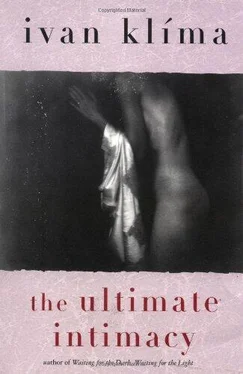Ivan Klima - The Ultimate Intimacy
Здесь есть возможность читать онлайн «Ivan Klima - The Ultimate Intimacy» весь текст электронной книги совершенно бесплатно (целиком полную версию без сокращений). В некоторых случаях можно слушать аудио, скачать через торрент в формате fb2 и присутствует краткое содержание. Год выпуска: 1998, Издательство: Grove Press, Жанр: Современная проза, на английском языке. Описание произведения, (предисловие) а так же отзывы посетителей доступны на портале библиотеки ЛибКат.
- Название:The Ultimate Intimacy
- Автор:
- Издательство:Grove Press
- Жанр:
- Год:1998
- ISBN:нет данных
- Рейтинг книги:3 / 5. Голосов: 1
-
Избранное:Добавить в избранное
- Отзывы:
-
Ваша оценка:
- 60
- 1
- 2
- 3
- 4
- 5
The Ultimate Intimacy: краткое содержание, описание и аннотация
Предлагаем к чтению аннотацию, описание, краткое содержание или предисловие (зависит от того, что написал сам автор книги «The Ultimate Intimacy»). Если вы не нашли необходимую информацию о книге — напишите в комментариях, мы постараемся отыскать её.
The Ultimate Intimacy — читать онлайн бесплатно полную книгу (весь текст) целиком
Ниже представлен текст книги, разбитый по страницам. Система сохранения места последней прочитанной страницы, позволяет с удобством читать онлайн бесплатно книгу «The Ultimate Intimacy», без необходимости каждый раз заново искать на чём Вы остановились. Поставьте закладку, и сможете в любой момент перейти на страницу, на которой закончили чтение.
Интервал:
Закладка:
2
Diary excerpts
Marek is happy. He has his cloudless sky at last and he and Alois were gazing at the stars until midnight, until I drove them out of the attic. Marek enlightened me about galaxies. There are infra-red galaxies and
X-ray galaxies. Moreover, galaxies cluster. Our galaxy belongs to a group of over twenty such clusters and those clusters measure three million light years. The clusters then form nests, and these can contain several thousand galaxies, which span as much as fifteen million light years. Supergalaxies, however, contain millions of galaxies and apparently light takes half a billion years to get from one to the other. The universe is composed of supergalaxies, but between them stretches empty space measuring hundreds of millions of light years.
It's true that I hesitated before I bought Marek the telescope. Not because it was expensive, but because it was a virtual endorsement of the doubts and comments that he tries to provoke me with. Then I said to myself that I would buy it for that very reason. We all live in doubt about the beginning and the end, and when he realizes this he won't need to test the firmness of my faith any more.
When I was carrying the telescope out of the shop I remembered Dad taking me to the planetarium. It was after his return from prison, and he talked to me about the boundlessness of the universe and how time defied the imagination. I wasn't particularly impressed by the planetarium, though; everything there was artificial. But that evening the sky happened to be clear and I went out and spent a long time, possibly an hour, gazing up at the stars. First of all I tried to identify the main constellations at least, but then I gradually became dizzy as I imagined the distances and the enormous quantity of burning matter. The idea of infinity excited me but also unsettled me. In fact I started to flee from it as I did from the gloomy notion of death which equally defied the imagination. Faith was a good way of escaping it, and still is. Except that there is no way one can entirely evade a reality that impinges all the time. After all, God is just as unimaginable as infinity.
For the first time in years I am reading Augustine, whom I used to revere for his intuition when I was a student and also because he considered love to be the basis of Christ's teaching. Now I find that, like Plato, he lacks sufficient knowledge of the world and nature to substantiate his views. Thus he reached most of his conclusions by deduction on the basis of assumptions which, without any evidence, he proclaimed to be beyond doubt. His explanation for God's existence outside of time and space was that in time and space one could not
discover supreme bliss and perfection. It is possible to displace everything great and beautiful from time and space, but not oneself or one's imagination.
These days we don't even have to worry about such justifications of God. I noticed the following sign on a wall not far from Tyl Square.
Posthumous experiences — The A.D.E.
I felt like adding: God on display 3 p.m. — 5 p.m., Wednesdays and Fridays.
Hana no longer goes to the hospital and has started to take charge of all the necessary arrangements for setting up a centre in our manse. There is a great deal to see to. It crossed my mind to commission Bára to design the structural alterations to the house. I like the idea of our undertaking a joint project. But she refused, saying we shouldn't tempt fate.
Hana is happy. She wants to install a potter's wheel and build a ceramics kiln, and also fit out a tailoring workshop. The board of Diakonia promised me they would get someone to undertake the structural plan gratis or at a very low cost. We have also given thought to people in the neighbourhood that we might employ at the centre. I thought of Máša: she could care for handicapped children; the work could give her some satisfaction seeing that her husband has deprived her of her own children — for the time being at least. For her part, Hana suggested Marika. She sings beautifully and plays the guitar. I wasn't too sure whether Marika would be a suitable person to work with children. She struck me as being too much of a daydreamer. (Alois likes Marika, although 'likes' is probably an inadequate description of their relationship:) However I said we could give her a try. Talking about the Diakonia fills me with an almost unexpected sense of relief. It's a bit like a shipwrecked sailor watching the arrival of a ship that might rescue him.
What's far more important though — to continue with my banal simile — is whether the people on the ship catch sight of the shipwrecked sailor.
I see Bára very seldom now. Her husband doesn't feel fit and assigns her most of his office duties. And he demands that she devote her remaining time to him. She says he often speaks about life losing meaning for him. He also offers her a divorce or his own death, both of which would save her work, he maintains.
Whenever Bára and I meet, she seems to be in a hurry. At the same time she looks at me with love and I have the feeling that her every movement is a plea for me to help her. Help her in what way? To find meaning in our life here on earth. She came full of doubt and misgivings about Jesus's divinity. She came to me to dispel her misgivings. But I failed. Instead of leading her towards the love of Jesus, I started to embrace her. I started to talk to her about my own love, which even lacks the fullness and purity that can be achieved by imperfect human love.
Except it is more likely that Bára came because she was seeking human love, not on account of her doubts about God. That was just a pretext.
You prove your love by your deeds. By being helpful and self-sacrificing, by standing by your loved ones when they need you. Love can also be defined negatively: not harming not abandoning, not lying and not betraying.
But how can that be applied in the case of two women who both regard you as their own? What then remains but a desperate effort to fulfil at least a few promises and resolutions; you then pay for it with further betrayals, lies and deceptions. It occurred to me that if I took a decision, irrespective of what it was, I would find relief. I could continue with my work without feeling that I've lost the right to proclaim the Bible's message. But then I realized that I couldn't continue anyway, as I lack sufficient faith!
Regarding the trip to Spain, Bára says her husband told her she could go to hell as far as he was concerned, but that Saša didn't deserve anything of the sort and he therefore opposed it. So they won't go anywhere.
I found it odd that she should accept someone else's decision like that without demur.
And what if he did something to himself while I'm there?' she asked. Then, apropos of nothing, she said: 'OK, I'll start to learn Spanish. '
I'd like in some way to define my state of mind, or more accurately, the state of my feelings.
Formerly I lived more calmly. I was not particularly happy but I definitely wasn't unhappy. I experienced neither moments of ecstasy nor of hopelessness. I did lots of useful and beneficial things and even had time for my hobbies.
Now there are times when I seem incapable of doing anything at all, unable to complete anything. And then all of a sudden I fall into some kind of trance and I sit down at the piano and improvise tunes that seem to me worth noting down, but mostly I don't bother because it seems to me more important to create them than to preserve them. Likewise, the carvings I do are different: more complex and dynamic. These days I usually portray a couple: a woman and child— as if previously I tried to capture a state whereas now it is a relationship, the tension between two human beings, whether mutual longing, alienation or passing each other by.
Читать дальшеИнтервал:
Закладка:
Похожие книги на «The Ultimate Intimacy»
Представляем Вашему вниманию похожие книги на «The Ultimate Intimacy» списком для выбора. Мы отобрали схожую по названию и смыслу литературу в надежде предоставить читателям больше вариантов отыскать новые, интересные, ещё непрочитанные произведения.
Обсуждение, отзывы о книге «The Ultimate Intimacy» и просто собственные мнения читателей. Оставьте ваши комментарии, напишите, что Вы думаете о произведении, его смысле или главных героях. Укажите что конкретно понравилось, а что нет, и почему Вы так считаете.






![Theresa Cheung - The Dream Dictionary from A to Z [Revised edition] - The Ultimate A–Z to Interpret the Secrets of Your Dreams](/books/692092/theresa-cheung-the-dream-dictionary-from-a-to-z-r-thumb.webp)





